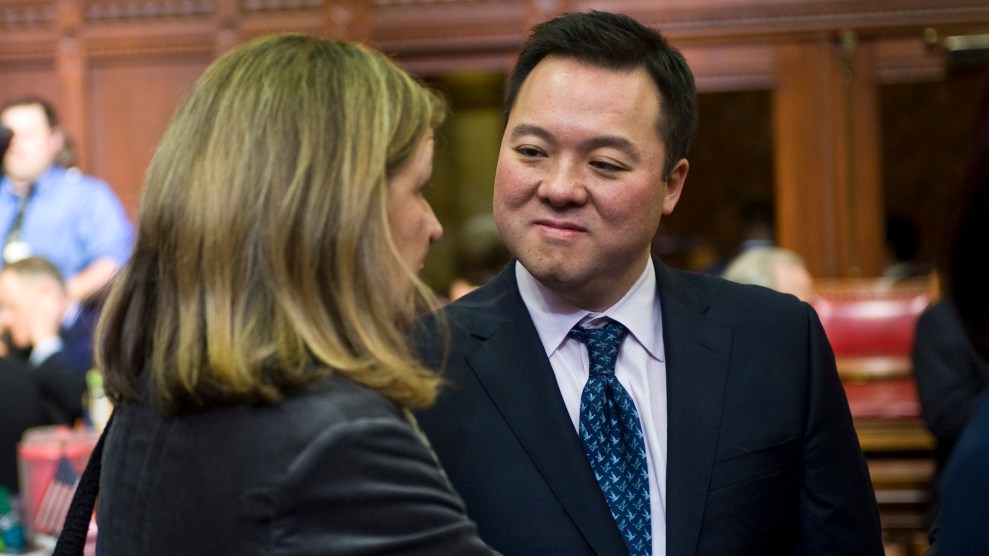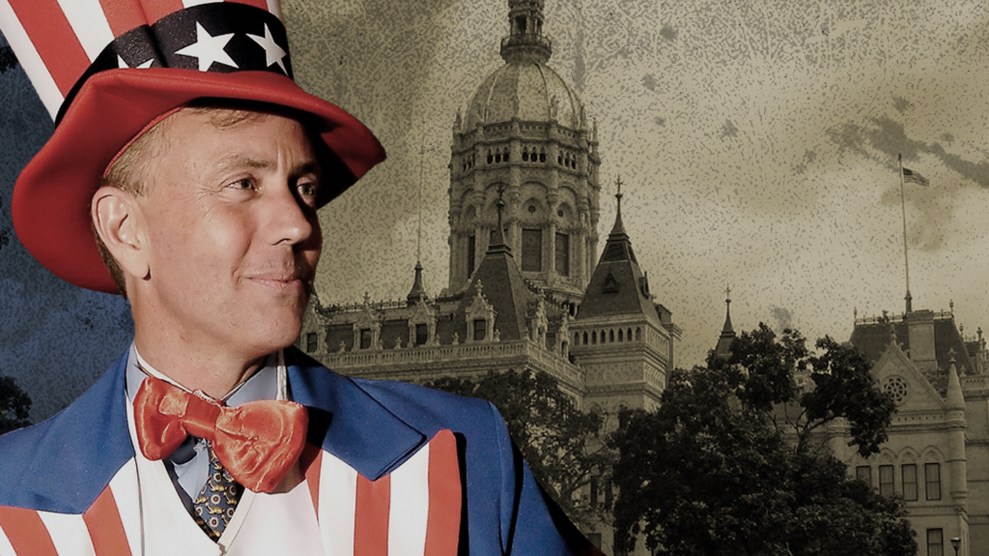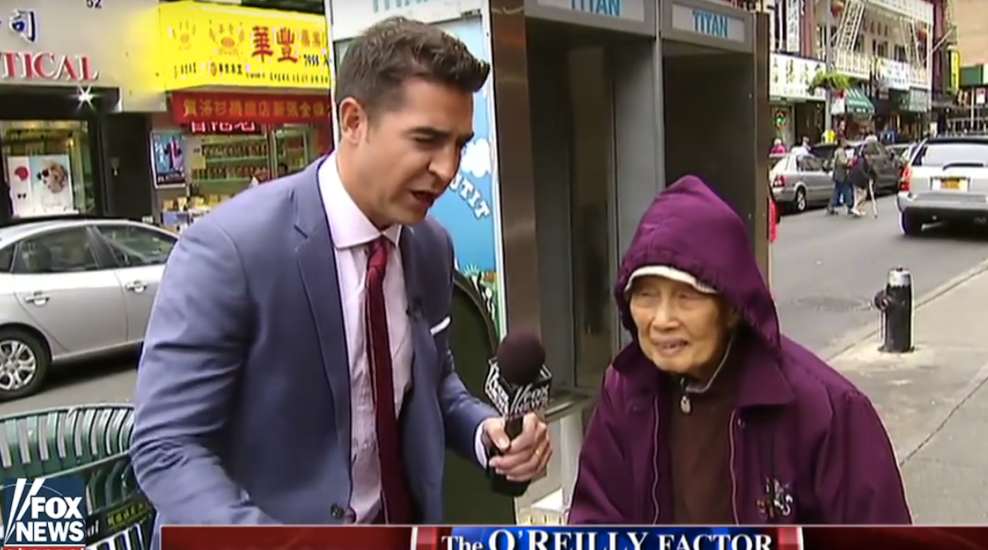
State Rep. William Tong, right, in the Connecticut legislature. Tong is running for state attorney general this year, and would be the first Asian American to serve in the role. Jessica Hill/AP
In Connecticut, people of color make up about a third of the state, but its elected officials have remained largely white over the years. The state has only elected one person of color to Congress in its history: Gary Franks, a black Republican, served in the House from 1991 to 1997. House candidate Jahana Hayes, who won the Democratic primary in August, would only be the second should she win in November.
Now, Rep. William Tong, who became the first Asian American to be elected to the state legislature 12 years ago, is running to be the state’s first Asian American attorney general. If elected, he would only be the second nationally, following now-Sen. Kamala Harris.
He speaks often about how important it is for a demographic largely overlooked in politics to have a seat at the table—noting, in unusual candor, how his sometimes difficult experiences as a person of color have helped him become a better lawmaker. Still, Tong says, he is often reminded of how much more progress has yet to be made—like when he’s confused for other Asian American public officials or when a discussion about diversity in the legislature completely ignores Asian Americans.
Tong, who is 45 years old and the son of Chinese immigrants, is hoping that the wave giving rise to a slate of diverse candidates, like Alexandria Ocasio-Cortez in New York and Ayanna Pressley in Massachusetts, will also power change in his home state. He’s campaigning on a vocal anti-Trump platform, focusing on how the president’s federal policies are affecting his constituents on issues including taxes and immigration. Tong says he hopes to use the office of attorney general as a firewall against the damaging policies of the Trump administration. Bolstered by his experience in the legislature, where he helped pass bills that banned bump stocks and required gun owners served with domestic violence restraining orders give up their firearms within 24 hours, Tong plans to “link arms with other attorneys general across the country” to push back against powerful interests like the gun lobby. His goals also include forming a civil rights division within the state, which would allow the office to be more proactive in taking on civil rights violations and abuses. Tong spoke with Mother Jones about the changing role of attorneys general, how a window in his family’s restaurant inspired him to push past barriers to entry, and his personal connection with Richard Nixon.
Mother Jones: You’ve been a state representative for 12 years now. What first prompted you to run for office?
William Tong: I made the decision in the middle of George W. Bush’s presidency. There was a lot of concern about the war in Iraq and where Connecticut was headed economically. I felt compelled to run because I think people wanted more from their state legislator. There was a real opportunity to do more.
For me personally, my parents are immigrants. No Asian American had ever been elected at the state level in Connecticut’s history. I spent all my life as an outsider to this process just by nature of who I am. Never mind having a seat at the table—we weren’t even in the same room. My parents had a Chinese restaurant, and I spent a lot of nights and weekends working there. I remember there was a window in the door between the kitchen and the dining room. I spent a lot of time looking out the window from the kitchen into the dining room where people ate in our restaurant and where we served them dinner and lunch. On the other side of that door I felt very much like an outsider, and I wanted to do something about that. I wanted to give voice to people who are invisible and feel invisible like my family and I feel very often still to this day.
MJ: Is that something you think about a lot, this idea of Asian American voices in politics?
WT: Yes. I not only think about that—I live that every day. Being an Asian American politician is a lot like being an Asian American—you spend much of your time feeling invisible. For example, there’s this traditional paradigm between black and white and now Hispanic. Often when people speak about racial injustice they say “black and brown.” When people say that my immediate visceral reaction is, “You must not see me. I’m invisible to you.” Because in that setup, I’m not included in that and neither are you—we’re omitted from that conversation. When I started in the judiciary committee, a state representative named Mike Lawlor, who happens to be gay, was the chairman. I think as a gay man, he was more attuned and sensitive to inclusion. I remember quite clearly one day he started making comments about a bill, and he started into the normal litany of “I don’t care if you’re black, white, Hispanic…” Then he skipped a beat, and he looked over at me and he said, “Asian.” That was really an important moment, because for the first time he remembered to acknowledge that we, as a community, were there. That was a direct result of me serving on the committee, of being elected. When people say, “Why is it important to have people of color? Why is it important for Asian Americans to run for office?” That was a very real expression of why it was important, because finally, for the first time in his mind and in that committee, we were acknowledged as part of that discussion. We still have a long way to go, but that incident sort of demonstrates how running for office can make a difference. I’ve raised a lot of awareness on, for example, how immigration issues now impact Asian Pacific American families like my own. The president talked about denaturalizing American citizens—like my parents, who are naturalized American citizens. When you see children separated from their parents at the border, when you see the travel ban enacted, all of that hits me very personally and viscerally.
MJ: Could you tell me more about your parents’ immigration story?
WT: My father came to Connecticut on a tourist visa from Canada and got a job through an employment agency at the Hong Kong Kitchen, where he met my mom. They got together and they opened a Chinese restaurant in Hartford, their own place, and one day an Immigration and Naturalization Service agent showed up. The agent was a customer, actually. He said basically, “Love you guys, love the food here, but you’ve overstayed your tourist visa. You’ve gotta go. You have to voluntarily self-deport.”
One night, my father was driving home, and he decided that he wasn’t done fighting and had to try something. He wrote a six-page, handwritten letter to the president of the United States, which was Richard Nixon. He sent it off and he thought, “Nothing’s gonna happen. Who’s gonna read this stupid letter?” Shortly before they were supposed to close up and go to Canada, the same INS agent came back to my parents’ restaurant and said, “The president received your letter and you can stay. You have to go to the back of the line and wait your turn.” How does that shape my worldview? It is proof to me, every moment of every day, that the democratic process, that our public institutions and the people who work in our public institutions and legislature and the executive branch and the judicial branch, are capable of doing great things for people and are capable of great acts of compassion and fairness. It’s really important to understand how those institutions work, how to pull the levers of democratic and public institutions. After 12 years of experience in the legislature, I have some mastery of it—I still learn every day—but when you are able to master those processes and those levers, you can do really critical, important things for people in our state.
MJ: What prompted you to run for attorney general now, and what do you feel like you can do in this office that you couldn’t accomplish as a state rep?
WT: In this moment so many of us feel like we have a target on our backs. That is largely due to the president and his policies and the way that he’s bearing down on people in Connecticut. It feels very much to me like if you’re an immigrant or if you’re a woman or if you just want to breathe clean air and drink water, or if you’re a Connecticut taxpayer, because of the state and local deductions, the president of the United States has declared war on you and your family, as have so many Republicans across the country. That really compelled me to take a hard look at running for attorney general. Like a lot of people, this is a deeply personal fight for me because it’s about my family, and my children, my parents, and so many people that share our experience as immigrants and people of color and people who live in the state. The other reason is that I have a lot of experience taking on powerful interests, much more powerful than Donald Trump, and beating them. Over 12 years, I’ve taken on the National Rifle Association, I’ve taken on the big banks, I’ve taken on the system of mass incarceration here in Connecticut. I have the experience to take on these powerful forces and beat them. In the Legislature, I’m limited to one house in one state. As attorney general, I can link arms with other attorneys general across the country and take on these powerful forces on a much larger scale.
MJ: How do you think the role of attorney general is changing under this administration?
WT: The way I see it is, we’re the firewall. I’m not sure we saw it that way a year and a half ago, but given what this president has done in a very short period of time to try to dismantle our way of life in this state and this country, it’s become very clear the attorney general is the first and last line of defense to protect our way of life. I don’t say that lightly and I don’t say that to be dramatic, I just think that’s where we are.
MJ: Recently, a Republican candidate called you “Kim Jong Tong” in a tweet. Have things like this happened to you before?
WT: It happens all the time. I was reminded today that I was asked to speak on MSNBC a few years ago when Jeremy Lin first had great success in New York City. There were all these off-color jokes and references about Jeremy Lin. I think there were Chinese takeout references referring to him and yellow this, yellow that. There was a brief—unfortunately too brief—conversation about how this kind of overt racism against Asian Americans is rarely acknowledged and often overlooked. I remember Saturday Night Live had a piece about how this sort of racism is acknowledged in other communities of color and it’s very obvious, but for Asian Americans, it’s something that we suffer often in silence. Because it goes unchecked. Somebody makes an off-color remark and there’s nobody to stand up for us. We’ve got Grace Meng, who’s a congresswoman in Queens. We’ve got John Chiang in California and Theresa Mah and Tammy Duckworth in Illinois, but it’s a handful of people. There’s me in Connecticut. When you don’t have a critical mass of people to stand up and call out this kind of racism and these injustices, they go unchecked.
MJ: There are so many more women and minority candidates this year, but a lot of people talk about things like electability, which sometimes seems like a code word.
WT: There’s a lot of dog whistles. Words like electability, like qualifications, those are dog whistle words.
MJ: How are national issues playing out in your home state?
WT: The national issues are critical in that the way they touch people in our state, that’s true about every state. This isn’t about Donald Trump the person, this isn’t about Donald Trump the tweeter, this is about his conduct and his policy and how his administration prejudices the people in Connecticut. When you talk about immigration, for example, we’re not just talking about some theoretical, amorphous group of immigrants who are being separated from their parents at the border. We’re talking about real kids who have been placed in facilities in Connecticut. We’re talking about real families that live in places like Sanford and Farmington and New Britain that have been ordered to leave the country by Immigration and Customs Enforcement that’s arbitrarily and capriciously targeting immigrants in Connecticut.
When you talk about the state and local tax deduction change and the term “tax law,” that’s a $2.8 billion tax increase on the people of Connecticut—the largest tax increase in state history. The tagline for my campaign is “For All of Us.” I chose that very purposefully, because so many of us in every racial, ethnic, gender, or sexual orientation group feel like we have a target on our backs. That’s what this moment means to me and that’s why I’m running.
MJ: Some people have pointed out that Connecticut as a whole is not a very racially diverse place. How has your campaign reached out beyond what people would call “identity politics”?
WT: I don’t agree with that. I think Connecticut is a diverse place, particularly in our urban areas—we’re sandwiched between New York City and Boston, so it’s a very high-density place in between two huge financial centers in the Northeast. But I think all of us share some part of our American story. We’re a nation of immigrants. We’re women, we’re immigrants, we’re people of color, we work in factories, we’re professionals; so many of us share some aspect or another of our experience. For me, as an Asian Pacific American, I know what it is to suffer hate and bigotry and have people come after your family. I think a lot of people share that experience. It resonates with them. You don’t have to be Asian American to know what that feels like. Many people in communities that I represent who you would not think of as people of color—Italian Americans, Irish Americans, Jewish Americans—it was just a generation ago, two generations ago, that they experienced the very same thing. When you speak to that it resonates, and I think people recognize that I have a unique voice to stand up to the president of the United States and tell him, “If you think you’re going to ride a wave of hate and bigotry and remake our world, you’re gonna have to come through me and all of us.” I’m just not afraid of him.
















